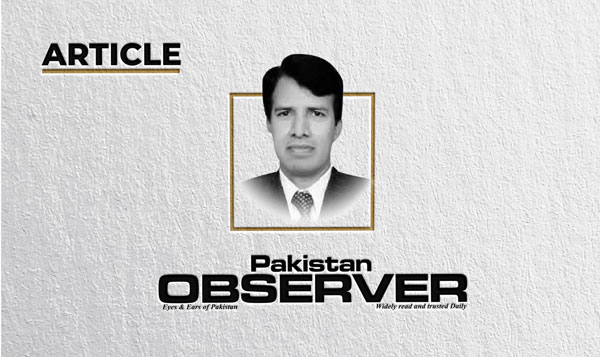Kashmiris’ resolve
THE people of Jammu and Kashmir had a historical linkage with the areas which became part of Pakistan in 1947. Indeed, there has been mutuality between the people of both areas for centuries. The people of Jammu and Kashmir ran a parallel movement against Dogra Rule alongside the All India Muslim League. They decided to become part of Pakistan after passage of the Pakistan Resolution on 23 March 1940. After approval of partition plan of India on 3 June 1947, Kashmiri leadership completed their homework for the State’s Accession to Pakistan.
In the same backdrop, on 19 July 1947, the people of Jammu and Kashmir unanimously passed a resolution for the accession of the state with the future state of Pakistan. The prominent Kashmir leaders Khawaja Ghulam-ud-Din Wani and Abdul Rahim Wani moved the resolution in the emergency session of the All Jammu and Kashmir Muslim Conference held in Srinagar. Since Pakistan was to become a reality for the Muslim of South Asia on 14 August 1947, therefore, the Kashmiri leadership hurriedly completed the needed legal formalities of state’s accession with their dreamland, Pakistan.
The State of Jammu and Kashmir and the areas constituting Pakistan today have historical relationship, which dates back to centuries. This relationship is rooted in the joint history of these two areas over the years and later turned into a relationship of interdependency. Religion, common culture, joint races on both the sides, migrations and inter-marriages further strengthened this bond between the people of the two sides. Besides, these linkages, geopolitics of Jammu and Kashmir and Pakistan are another compelling factor which essentially unite these areas. All natural routes to various parts of the Jammu & Kashmir are from Pakistan.
The only link, India exploited in 1947, through Gurdaspur (Pathankot) was an unnatural link which India manipulated through Radcliffe Award by dividing Punjab in violation to the rules of partition of India. As per the Indian partition plan (June 3, 1947), Kashmir was to become part of Pakistan, based on the wish of the people and geographical contiguity of the State with Pakistan. The people of Jammu and Kashmir with overwhelming Muslim population (77%) were deprived from their basic right to decide their future, thus rose to occasion and revolted against then Ruler of the State, Maharaja Hari Singh.
Kashmiri volunteers organized themselves into Kashmiri irregular forces and liberated a portion of the state from the regular forces of Maharaja Hari Singh. They also established their own government; “Azad Jammu and Kashmir”. This portion was to act as the base camp for the liberation of the rest of the state from Indian occupation. Azad Jammu and Kashmir (AJK) is enjoying the status of maximum constitutional and financial autonomy, ever since formation of AJK Government. However, in Indian Illegally Occupied Jammu and Kashmir (IIOJK), the autonomy was reduce through a gradual process and finally the State was relegated to union territories and illegally annexed it with Indian union in August 2019.
On its part, Pakistan fully respects the autonomous status of Azad Jammu and Kashmir. As per 13th Amendment, AJK Assembly enjoys the legislative powers for political dispensation as per the will of the people. There is a control of taxation revenue generation with the AJK Government after transfer of powers from Kashmir Council to AJK Government. All the appointments in judiciary and executive in AJK are done with the approval of the Prime Minister of Azad Jammu and Kashmir. In a way, Pakistan did not disturb the AJK Government in its autonomous functioning ever since the establishment of AJK Government.
During the on-going struggle of Kashmir, started in 1990, over 100,000 Kashmiri people lost their lives at the hands of brutal Indian forces. Over 900,000 Indian security forces are continuing with their brutalities in Indian Illegally Occupied Jammu and Kashmir (IIOJK). Indian security forces have total impunity under the discriminatory and inhuman laws, India especially imposed ever since the 1990s. Despite heavy Indian military deployment in IIOJK and unilateral and illegal relegation of the status of IIOJK in August 2019, it could not defeat the will of Kashmiris for attainment of their right of self-determination. Over the years, the political dispute of Kashmir has become a humanitarian issue, since there have been massive human rights violations in IIOJK by Indian security forces.
In fact, there is a state-sponsored terrorism going on in IIOJK since 1990. There is an organized campaign of genocide going on against the people of India-occupied Kashmir. This is indeed the darkest aspect of India which civilized international community is constantly ignoring. Although, the United Nations, Amnesty International and many other human rights organizations has been raising the issue of Indian human rights violations in Kashmir, yet there have been no action against India on those accounts. Rather, the major powers are enhancing their political and economic linkages with India. The current wave of Kashmiris uprising, renewed following the martyrdom of Burhan Wani in July 2016, has added a new chapter to the Kashmiris sacrifices for their right of self-determination. Kashmiris are determined to get their right and ultimately join Pakistan.
On its part, India is continuing its brutalities in IIOJK and after 5 August 2019, it is in the process of changing its demography through a gradual process of issuing domicile to Non Kashmiri Hindus. India is in fact endangering peace of the South Asian region. India must understand that the resolution of Kashmir dispute is essential for peace and stability in South Asia. This dispute has to be resolved as per the wishes of Kashmiris and in the light of the UN resolutions. They demand from the UN and all international forums to help them in the solution of the Kashmir dispute as per the UN resolutions.










